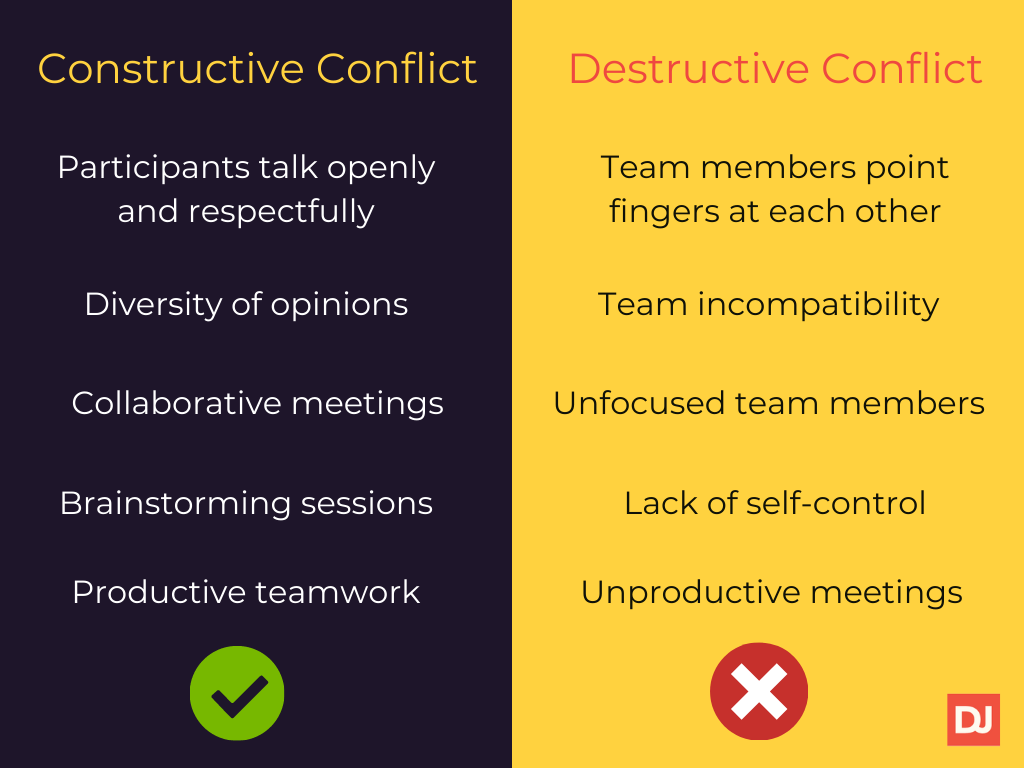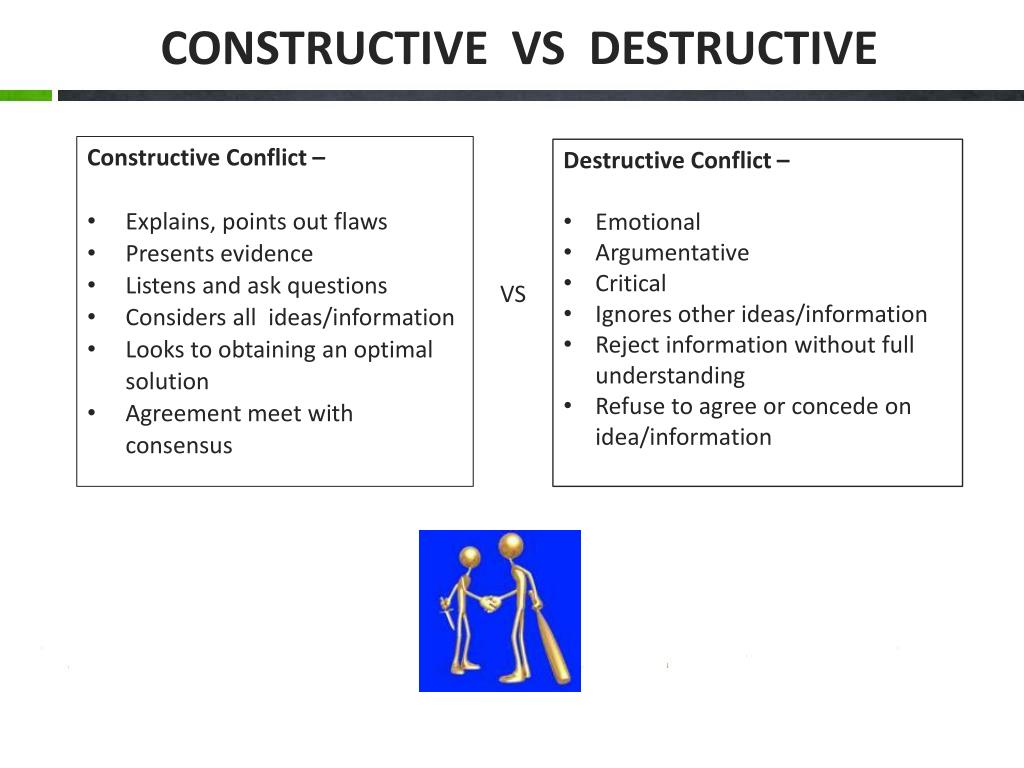Explain 3 Differences Between Destructive and Constructive Conflict
In addition coming up with adjustments is necessary for managing this type of conflict. This occurs typically due to how people are different from one another.

Comparing Constructive And Destructing Conflicts Download Scientific Diagram
All businesses have conflict.

. Rejecting others viewpoints before you fully understand their position. But nationalism doesnt always mean being pro-independence. Waves can be destructive.
Beneficial or destructive and harmful In project situations and judgments and interpretation of facts This often results in negative emotional states and behaviors intended to prevail Destructive team conflicts and deception whereas destructive conflict can impair organizational performance and devastate employee morale constructive conflict has a strong belief that all. It can cause buildings to collapse or cause avalanches perhaps in conjunction with forces generated by weather events which we would regard as destructive. Threats criticism contempt hostile remarks and jokes sarcasm ridicule intimidation faultfinding and blaming and denials of responsibility - Also has its constructive side.
At a cosmic scale it can organise matter into stars planets and solar systems which we would regard as constructive. Research has shown that the more positive we feel the more flexible and creative we are in the way that we work. Mocking or ridiculing others position.
Ignoring or dismissing others ideas. Check in with your emotions. Refusing to reconsider your position.
Positive outcomes 2 workplace conflict requires time. Then the water runs back down the beach - this is called the backwash. Constructive criticism has a positive impact on the individual.
Or differences in views and ideas eg. If the conflict leads to the approximation of attitudes compromise it is a constructive conflict if after argumentation the differences are deepened and problems become even greater it is a destructive conflict. Characteristics of destructive criticism.
Features of destructive conflict. The results of the studies presented in this literature review are consistent with the emotional security hypothesis. There are differences in the emotions and in the intervening behaviour depending on how destructive or constructive the parental conflict behaviour is because constructive conflict behaviours increase the emotional security of children Davies et al.
- Communicated in a variety of ways that are likely to produce destructive conflict. They provide us with important information even in the context of workplace conflict. The idea is to strengthen or redefine the relationship for the.
Destructive criticism is often a blow to ones self-esteem. Disagreeing for the fun of a fight. However when interpersonal conflict gets too destructive.
Of the three types of conflict. When a wave breaks water is washed up the beach - this is called the swash. Conflicts require at least two parties and if these parties come to an approach compromise and decision-making in the course of the.
Positive or constructive conflict can be beneficial to a family business when it increases opportunity recognition produces high-quality decisions encourages growth strengthens groups and individuals increases the learning necessary for entrepreneurial behavior and increases the. Groups of people working to advance the interests of their nation country or would-be country is known as nationalism. Impact on the individual.
Controversy is a necessary but not a sufficient condition for workplace conflict to have. With destructive criticism anger and contained aggressiveness are exhibited. We are built with emotions for important reasons.
The first of the three types of conflict in the workplace task conflict often involves concrete issues related to employees work assignments and can include disputes about how to divide up resources differences of opinion on procedures and policies managing expectations at work and judgments and interpretation of facts. Destructive criticism does not aim to improve the individual. Therefore they refuse to accept it hence wont learn anything from it.
Take the force of gravity. It can be a good thing or it can be a bad thing. Nevertheless many times even if the criticism is constructive people might view it as unacceptable.
Constructive criticism directly addresses an issue or mistake. De Dreu further suggests that. Often nationalism is invoked by groups pushing for independence especially when they are ruled by perceived outsiders.
The main difference between constructive and destructive interference is that constructive interference occurs when the displacements of the waves that meet are in the same direction whereas destructive interference occurs when displacements of the waves that meet are in the opposite directions. They may even feel offended which can lead to conflict. Constructive conflict describes any conflict in which the conflicting parties willingly engage in such a way so as to not only ensure a mutual benefit but that the benefit of actually engaging outweighs the costs of either the conflict or the engagement itself.
Interpersonal conflict refers to a conflict between two individuals. The Difference Between Constructive and Destructive Conflict No-Conflict Definition. Destructive conflict occurs when two or more people engage in actions and behaviors that result.

Pdf Constructive Conflict Destructive Conflict Mohan Ram S Academia Edu

Conflict Resolution Constructive Versus Destructive Ppt Download

Ppt Constructive Vs Destructive Powerpoint Presentation Free Download Id 2924897

Constructive Conflict How To Promote It In A Remote Business Environment Distantjob Remote Recruitment Agency
0 Response to "Explain 3 Differences Between Destructive and Constructive Conflict"
Post a Comment